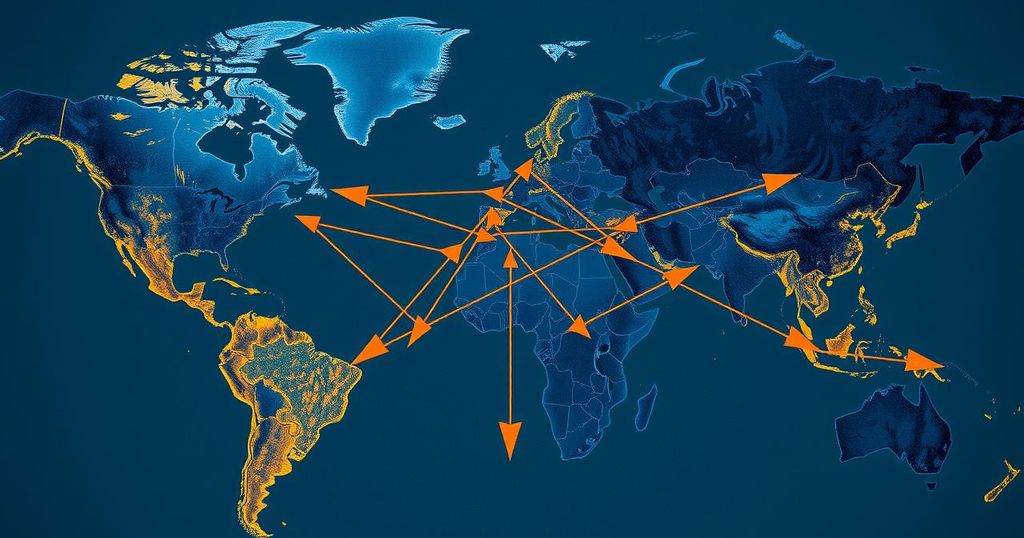Elections
Politics
AIR FORCE ONE, ASIA, DONALD TRUMP, ECONOMICS, EUROPE, EUROPE/ASIA, FOX BUSINESS, INDIA, INFLATION, KEVIN HASSETT, NATIONAL SECURITY, NORTH AMERICA, POLITICS, PUTIN, REUTERS, RUSSIA, SKY NEWS, TRUMP, U. S, UK, UKRAINE, UNITED STATES, US, US PRESIDENTIAL ELECTION, WHITE HOUSE, YVETTE COOPER
Dante Raeburn
Impending U.S. Reciprocals: India Strategizes Ahead of April 2 Deadline
As President Trump approaches the April 2 deadline for reciprocal tariffs, he emphasizes efforts to target all nations initially. India is proactively negotiating a bilateral trade agreement with the U.S. to mitigate adverse impacts. The U.S. aims to address significant trade imbalances, while India seeks to safeguard its interests amid concerns over reciprocal tariffs, especially in sensitive sectors. The outcome of these talks will play a crucial role in shaping future trade relations between the two nations.
As the April 2 deadline approaches, U.S. President Donald Trump has indicated that he intends to implement a strategy of reciprocal tariffs encompassing all nations, not merely targeting a limited subset. While Trump initially mentioned broad applicability, White House economic advisor Kevin Hassett suggested the focus could narrow to around 10 to 15 nations experiencing substantial trade imbalances. However, the specifics regarding which countries will be impacted, the nature of calculated tariffs, or potential exemptions remain unclear, raising concerns in the global trade community.
The potential tariffs are a cornerstone of Trump’s effort to recalibrate global trade dynamics and bolster U.S. manufacturing. Although Trump has expressed intentions to balance international trade and potentially utilize tariffs as leverage for better agreements, the looming trade war threatens market stability and raises recessionary fears domestically. UK Secretary of State Yvette Cooper cautioned that such trade barriers would adversely affect the global economy and individual nations.
India recently engaged in dialogues with the U.S. about a proposed bilateral trade agreement (BTA), signaling intentions to deepen cooperation. Following negotiations, the Indian Commerce Ministry announced that sectoral discussions would initiate virtually in the near future, setting a timeline for further in-person negotiations. The objective within these talks is to reduce tariffs and non-tariff barriers, thereby enhancing supply chain integration in a mutually beneficial manner, with ambitions expressed to elevate bilateral trade from $190 billion to $500 billion by 2030.
This trade initiative includes discussions on duty exemptions in various sectors such as automobiles and agricultural products, while India may seek reductions in tariffs on textiles. Officials acknowledge challenges surrounding sensitive sectors like agriculture, which may be less amenable to negotiation. Furthermore, Trump praised Indian Prime Minister Narendra Modi, expressing optimism that trade discussions will yield favorable outcomes. In light of the potential tariffs, Indian industries are advocating for protection against negative impacts on trade with the U.S., India’s largest trading partner.
In recent data, the U.S. and India maintained a robust trading relationship, with U.S. agricultural exports to India reaching $1.6 billion in 2024. Key exports included almonds, pistachios, and ethanol, while India’s primary exports to the U.S. involved pharmaceuticals and precious stones. Despite trade surpluses favoring India significantly, concerns over reciprocal tariffs loom large, with U.S. demands for increased market access intensifying under the backdrop of political sensitivities in India’s agricultural sector. FDI from the U.S. continues to be substantial, indicating an intertwined economic relationship that could be threatened if reciprocal tariffs are implemented.
In summary, as the April 2 deadline approaches for the implementation of reciprocal tariffs by the U.S., uncertainties prevail concerning which countries will be targeted, and the specific terms of these tariffs. India has actively engaged in trade discussions with the U.S. to mitigate potential negative impacts and expand its trade relationship. The outcome of these negotiations is critical for both nations, as tariffs could significantly influence market dynamics, trade balances, and economic stability.
Original Source: www.livemint.com








Post Comment